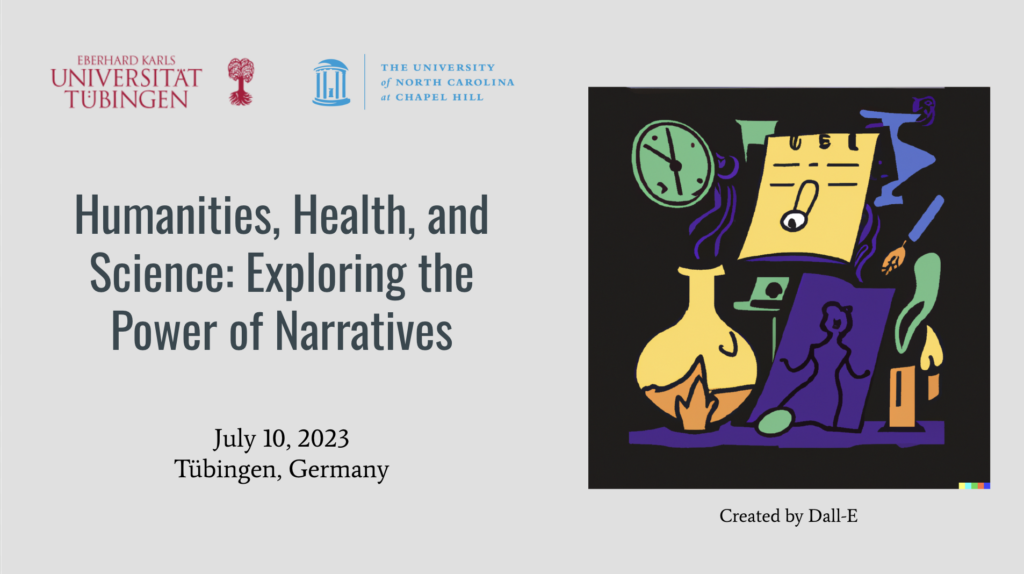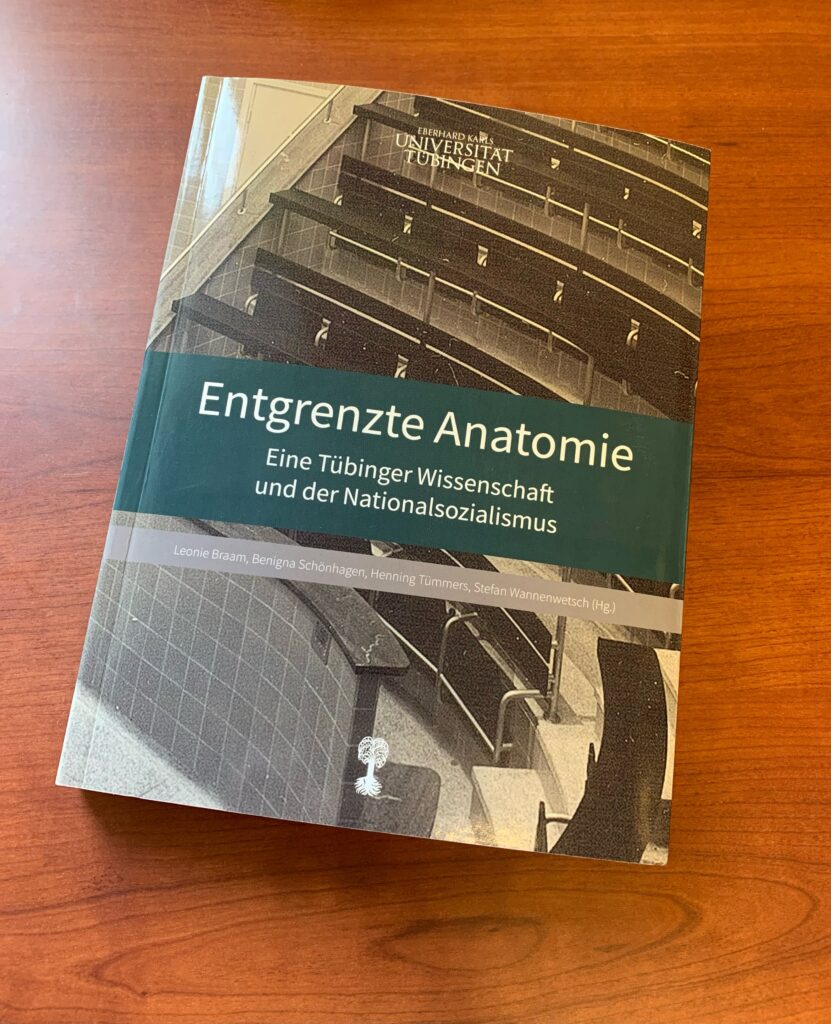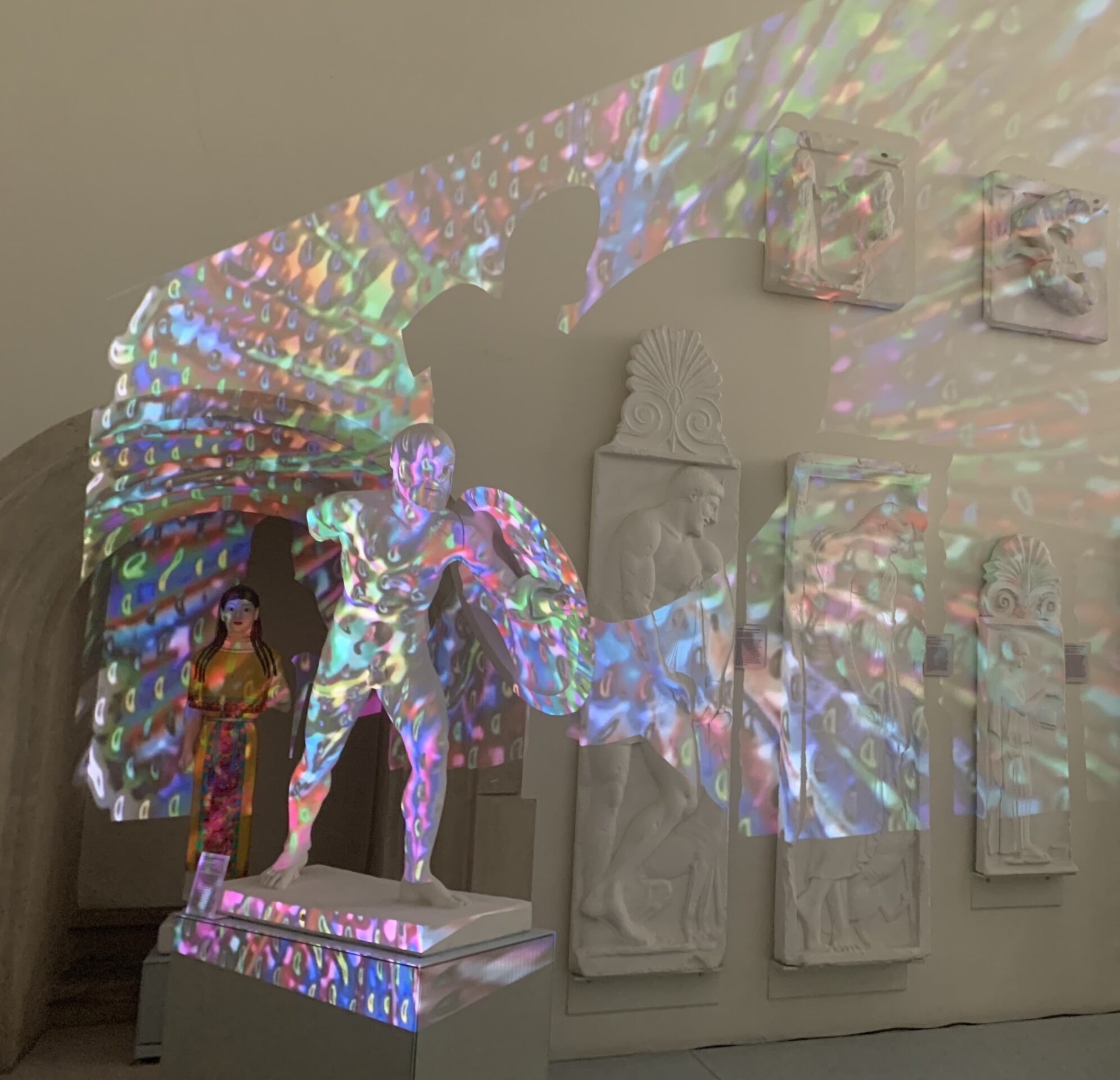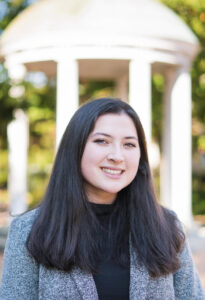During the summer, HHIVE Lab’s Dr. Kym Weed and Dr. Jordynn Jack had the opportunity to travel to Tübingen, Germany as part of a UNC Global Partnership award, a program run by UNC Global to establish and encourage international rapport with UNC’s strategic partners. They were invited to join the ongoing UNC-Tübingen collaboration by Dr. Courtney Rivard who noticed a growing interest in health humanities at Eberhard Karls Universität Tübingen while visiting over the past few summers in Germany. Rivard introduced the HHIVE team to scholars interested in the health humanities, and together they explored interdisciplinary connections within the health humanities field.

The primary event of the program was the co-hosted health humanities workshop: “Humanities, Health, and Science: Exploring the Power of Narratives.” The aim of the workshop was to build a cross-institutional and multi-disciplinary community by sharing background interests and ideas for collaboration. During the workshop, six groups — each composed of members from UNC and Tübingen — introduced themselves and their research projects. The community’s disicinplinary backgrounds spanned every corner of the humanities — from narrative medicine to medical ethics, studies in philosophy to public outreach and communications — and produced a round-table gathering that fueled synergetic conversation.
At the workshop, the group brainstormed further collaborative projects that could bridge the health humanities studies at UNC and Tübingen. One idea was to create a shared dataset or edited volume, where each professor could explain their methodologies and approaches to the health humanities. Because the health humanities is not strictly bound to English or literary studies methodologies, researchers can incorporate perspectives and tactics from other disciplines, such as communications, anthropology, or philosophy, to name a few — this leads to a richer, more holistic analysis of the field.

Dr. Weed and Dr. Jack also attended two guided tours while in Tübingen. The first was of an exhibit in the Universität Tübingen anatomy building, a space where professors, researchers, and students collaborate day-to-day. The program, titled “Entgrenzte Anatomie,” or “Unbounded Anatomy,” explored the origins and legacies of the university’s anatomical collections of human remains. A group of curators, composed of faculty and graduate students, used this program to explore the connection between the remains and Nationalsozialismus, or national socialism, which was the official political ideology of the Nazi Party of Germany.
The exhibit confronted the anatomy lab’s unsavory history of collecting remains during the Nationalsozialismus period, using archival research to reveal how the bodies were acquired. The curators were mindful to display the bodies in a way that was not voyeuristic. Remains were shrouded behind frosted glass, protected by the lack of visibility, and skulls were turned away from the exhibit’s audience. Weed explained that the university’s student activists were concerned and uncomfortable with the remains’ uncertain origins. Would they, as curators of the exhibit, be complicit in erasing the legacies of these people by putting them on display?
“Entgrenzte Anatomie” and its creators brought up a statement about human research that is crucial to the health humanities: intentionality in exhibition. To reflect on the implications of their anatomy collections, the exhibit included shrouds, which were embroidered with the names of each individual whose remains were used in the lab. Many of these individuals were people who were seen as “disposable” by their society, such as asylum patients or prisoners of war. Audience members could elect to watch an artist embroider the names, taking part in the contemplative experience. Because the health humanities is dedicated to the personal expressions and experiences of health, “Entgrenzte Anatomie” was a necessary reflection on the importance of conserving the legacies of medical victims throughout history.

The second exhibit that Dr. Weed and Dr. Jack visited was “Micropop,” an interactive exhibit that made the microbial world visible in a colorful and experiential way. The common narrative of microbes promotes eradication and antagonism, but “Micropop” emphasized the interdependence of humans and microorganisms. The audience could interact with a variety of displays, from speakers that mimicked microbial communication to petri dishes that formed letters out of bacteria. With a playful, encouraging environment, “Micropop” brings to life the world of microbes.
According to Weed and Jack, “Micropop” was an inspiring model for health humanities coursework, as it blended the disciplines of science (specifically microbiology), visual art, and industrial design. While touring the exhibit, Weed and Jack met some of its creators: students in these three fields, who united through sharing research and combining their methodologies. Together, they translated scientific findings into widely communicable art installations — a transformation that could inspire many researchers within the health humanities.
Dr. Weed and Dr. Jack both described their experience in Tübingen as an enriching, informative, and gratifying opportunity. The exploratory, multi-disciplinary programs with which they engaged act as a model for future health humanities endeavors, as well as future global connections for UNC and the HHIVE Lab.
 Catherine Pabalate is a second-year student at UNC-Chapel Hill majoring in English and comparative literature, biology, and medical anthropology. Her academic focus is on narrative medicine and how literature can be used to expound personal experiences of illness. In her free time, Catherine enjoys reading Gothic-inspired novels, writing mystery fiction, and working as a co-director for the Campus Y Catalyst Conference. Her goal after graduation is to pursue academia in order to teach others about the value of the health humanities.
Catherine Pabalate is a second-year student at UNC-Chapel Hill majoring in English and comparative literature, biology, and medical anthropology. Her academic focus is on narrative medicine and how literature can be used to expound personal experiences of illness. In her free time, Catherine enjoys reading Gothic-inspired novels, writing mystery fiction, and working as a co-director for the Campus Y Catalyst Conference. Her goal after graduation is to pursue academia in order to teach others about the value of the health humanities.

